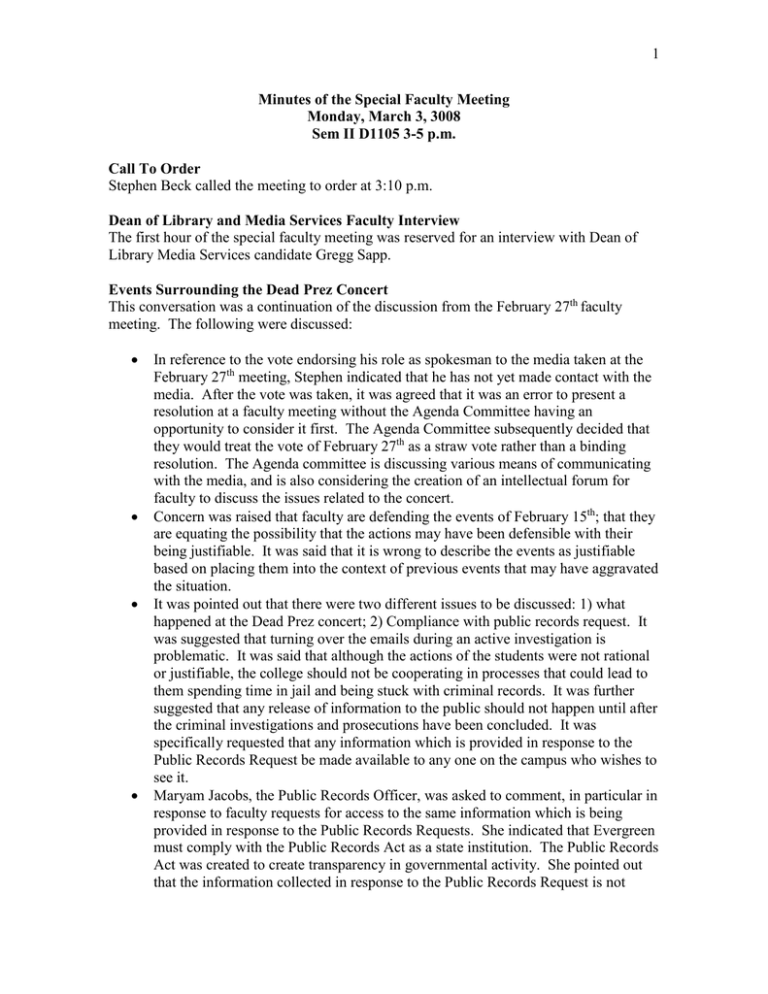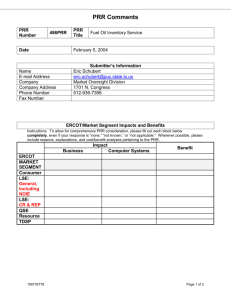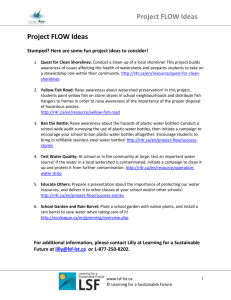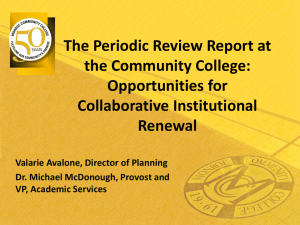March 3, 2008 (PDF)
advertisement

1 Minutes of the Special Faculty Meeting Monday, March 3, 3008 Sem II D1105 3-5 p.m. Call To Order Stephen Beck called the meeting to order at 3:10 p.m. Dean of Library and Media Services Faculty Interview The first hour of the special faculty meeting was reserved for an interview with Dean of Library Media Services candidate Gregg Sapp. Events Surrounding the Dead Prez Concert This conversation was a continuation of the discussion from the February 27th faculty meeting. The following were discussed: In reference to the vote endorsing his role as spokesman to the media taken at the February 27th meeting, Stephen indicated that he has not yet made contact with the media. After the vote was taken, it was agreed that it was an error to present a resolution at a faculty meeting without the Agenda Committee having an opportunity to consider it first. The Agenda Committee subsequently decided that they would treat the vote of February 27th as a straw vote rather than a binding resolution. The Agenda committee is discussing various means of communicating with the media, and is also considering the creation of an intellectual forum for faculty to discuss the issues related to the concert. Concern was raised that faculty are defending the events of February 15th; that they are equating the possibility that the actions may have been defensible with their being justifiable. It was said that it is wrong to describe the events as justifiable based on placing them into the context of previous events that may have aggravated the situation. It was pointed out that there were two different issues to be discussed: 1) what happened at the Dead Prez concert; 2) Compliance with public records request. It was suggested that turning over the emails during an active investigation is problematic. It was said that although the actions of the students were not rational or justifiable, the college should not be cooperating in processes that could lead to them spending time in jail and being stuck with criminal records. It was further suggested that any release of information to the public should not happen until after the criminal investigations and prosecutions have been concluded. It was specifically requested that any information which is provided in response to the Public Records Request be made available to any one on the campus who wishes to see it. Maryam Jacobs, the Public Records Officer, was asked to comment, in particular in response to faculty requests for access to the same information which is being provided in response to the Public Records Requests. She indicated that Evergreen must comply with the Public Records Act as a state institution. The Public Records Act was created to create transparency in governmental activity. She pointed out that the information collected in response to the Public Records Request is not 2 being provided to law enforcement agencies. Ken Tabbutt indicated that there are currently 7 Public Records Requests for e-mails related to the Dead Prez concert and ensuing riot. He indicated that if any information is not turned over in response to these requests, the college is subject to fines and penalties, which can be severe. He reminded the faculty that student names and personal information will be redacted before the emails are turned over to the requestors. He also added that the Attorney General’s office is reviewing all of this to ensure that the college is complying with the Public Records Act. He said that complying with the Public Records Request is not an attempt by the administration to air the college’s dirty laundry but that the college must provide the requested documents in accordance with the PRA. It was clarified that all student information is removed from any emails which are provided via the PRR’s. A question was raised regarding the history of penalties being imposed when faculty do not comply with a PRR. Maryam responded that at other colleges in Washington the faculty are informed that they must comply. The University of Washington has lost cases in regards to PRR’s. It was further asked what procedures would be used to locate non-compliance and who would be responsible for any fines should it be found that Evergreen did not comply. Maryam responded that the college would not be attempting to identify non-compliance, but that if non-compliance is discovered later the agency is normally held liable. Paul Gallegos explained that non-compliance is often discovered because one person who is on a series of emails will not turn something in that others know exists. The legality of asking faculty to turn over documents was questioned. Concern about the political ramifications of faculty and staff turning over e-mails to the Public Records Officer was described as having the potential to create a chilling effect, constraining open communication between faculty, staff and students. It was asked who should make decisions regarding what needs to be turned over in response to a PRR, and what will happen to employees who are taking a principled stand and don’t respond to the PRR. It was said that the Act was not created for the purpose of disclosing email between faculty and others, which should be exempt based on issues of Academic Freedom. Don Bantz responded by indicating that the Attorney General decides what needs to be turned over, and it’s likely that she will order the college to comply with the Public Records Request. If she does indicate this the college will have no recourse but to comply. The law is clear about what must be turned over. If information is received that someone has not turned over information that should be, then some action must be taken to bring the college back into compliance. This could initially mean requesting that the documents be turned over and possibly taking disciplinary action if that does not resolve the situation. The college could be assessed significant fines if it does not comply appropriately with the PRA. Questions were raised regarding whether or not images are protected. Maryam indicated that the images of the riot on February 15th are not protected. Since copies of the video have already been posted on sites like Utube there is no legal justification for withholding them. Ken Tabbutt indicated the college has no recourse to providing records, but suggested there may be an opportunity to work with other institutions of higher 3 education to discuss whether or not higher ed should be held accountable under the PRA in the same way that other state agencies are. It was stated that the University of Washington has been forced to comply historically. No distinction has been made under the law between faculty and other types of state employees. Concerns were raised about the language of the original email informing the faculty of the need to comply with the PRR’s. This e-mail suggested that all correspondence needs to be turned over (vs. only college e-mail). It was suggested that the timeline for turning over information is unreasonable and that the college should get the opinion from the AG first and then respond. It was also suggested that three people should be working on redacting personal information rather than just one, as one person may not see every instance where information should be redacted. It was suggested that although the college may not want to enthusiastically participate in the investigation and prosecution of the wrongdoers, but it also shouldn’t be seen as hiding them either. It was suggested that a forum with the Olympia Police Department might be productive. Concern was also expressed that the faculty may be sending a message to the students that they are not personally accountable for their actions. It was also noted that bullying behavior was exhibited at the last community forum. Concern was raised that staff get an ethics orientation regarding the use of email, etc. but faculty don’t. It was suggested that this needs to be addressed. It was pointed out that some faculty and staff want to explore a truth and reconciliation process to deal with some of these issues. This would allow for discussion around both what happened on the 14th and 15th and the conditions that make the actions understandable if not defensible. Attention was drawn to the local newspaper Works in Progress, which has articles in it by Tony Zaragoza and Peter Bohmer as well as an article about former student Briana Waters, who is being tried on a University of Washington case. Concern was expressed that evaluations were apparently turned over by an office on campus without a subpoena. Maryam responded that no evaluations have been turned over by her office as part of this process. It was suggested that the faculty union needs to take a strong position to see if disclosure under the PRR can be challenged to protect civil liberties and academic freedom. Stephen closed by suggesting that there are several possible avenues to pursue, including a legal challenge to the PRR’s. There may be a role for the AC to play in taking a political stand on this issue; a resolution could be brought before the faculty urging a strong stand for academic freedom. Another option is the truth and reconciliation model, although it is not clear that the Agenda Committee would play a primary role in developing that. Stephen adjourned the meeting at 5:00.



